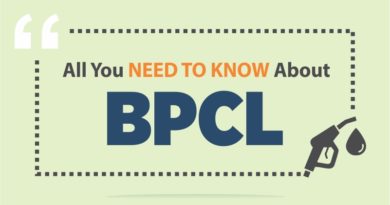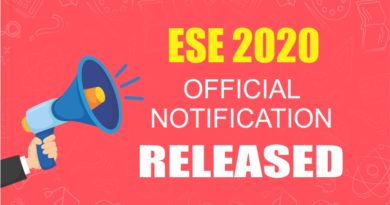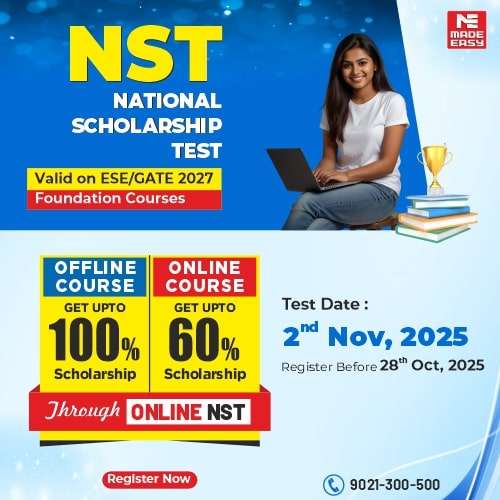SSC JE 2025 Exam Pattern, Syllabus & Eligibility Criteria
A detailed analysis of SSC JE 2025 Exam Pattern, Syllabus and Eligibility Criteria
With the aim of securing a promising government job in the public sector domain, hundreds and thousands of engineering graduates appear for the SSC JE examination. SSC-JE is conducted by the Staff Selection Commission to fulfil the post of Junior Engineers in various government departments. If you want to prepare for SSC JE 2025, then read this blog today because here you are being given detailed analysis of SSC JE 2025 Exam Pattern, Syllabus and Eligibility Criteria so that you can prepare properly for SSC JE exam.
Also, the Staff Selection Commission conducts this recruitment for a good amount of vacancies; therefore, SSC-JE is the most chosen exam amongst engineering graduates as it helps them utilize their technical skills along with building a promising career and overall development.
Therefore, it becomes quite essential that the aspirants preparing for the SSC JE 2025 know all about this examination to ensure they make the right decision and take the right steps. Before we dive into the SSC JE 2025 Exam Pattern, syllabus, and eligibility criteria of SSC JE 2025, let us figure out the answers to some of the most common queries.
What is the full form of SSC-JE?
SSC JE full form is Staff Selection Commission Junior Engineer.
Why is SSC-JE so popular?
SSC-JE holds amazing opportunities for engineers who want to prepare for the SSC exam. Some other reasons that make the SSC-JE exam popular are as follows:
- The syllabus is significantly less than that of the UPSC exam.
- One can get the right opportunity according to their personality and choice, which may include the Ministry of Railways and the Ministry of External Affairs.
- Facility to get exposure to both technical and real-world aspects, along with a promising salary.
Is there any negative marking in the SSC JE 2025 exam?
As per the SSC JE 2025 official notification, there is a negative marking of 0.25 marks for each wrong answer in Paper-I and one (01) mark for each wrong answer in Paper-II.
When will the SSC JE 2025 online registration start?
SSC JE 2025 online registration may start from 30.06.2025 to 21.07.2025.
What is the marks distribution in SSC JE 2025 Exam Pattern?
SSC JE 2025 Exam Pattern:
The Computer Based Examination will be conducted in two papers, as indicated below:
Paper-I
Paper-II
| Papers | Mode of Examination | Subject | No of Questions/ Max. Marks | Duration |
|---|---|---|---|---|
| Paper-I | Computer Based Examination | i) General Intelligence and Reasoning (ii) General Awareness (iii) Part-A: General Engineering (Civil & Structural) or Part-B: General Engineering (Electrical) or Part-C: General Engineering (Mechanical) |
50/50 | 2 Hours (2 hours and 40 minutes for the candidates who are eligible for scribe as per Para-9.1, 9.2 and 9.3) |
| 50/50 | ||||
| 100/100 | ||||
| Paper-II | Computer Based Examination | Part-A: General Engineering (Civil & Structural) or Part-B: General Engineering (Electrical) or Part-C: General Engineering (Mechanical) |
100/300 | 2 Hours (2 hours and 40 minutes for the candidates who are eligible for scribe as per Para-9.1, 9.2 and 9.3) |
Note: There will be a negative marking of 0.25 marks for each wrong answer in Paper-I and 01 mark for each wrong answer in Paper-II. Candidates are, therefore, advised to keep this in mind while answering the questions.
SSC JE 2025 Syllabus
Paper-I:
General Intelligence & Reasoning:
The Syllabus for General Intelligence would include questions of both verbal and non-verbal types. The test may include questions on analogies, similarities, differences, space visualization, problem-solving, analysis, judgment, decision-making, visual memory, discrimination, observation, relationship concepts, arithmetical reasoning, verbal and figure classification, arithmetical number series, etc. The test will also include questions designed to test the candidate’s abilities to deal with abstract ideas and symbols and their relationships, arithmetical computations, and other analytical functions.
General Awareness:
Questions will be aimed at testing the candidate’s general awareness of the environment around him/her and its application to society. Questions will also be designed to test knowledge of current events and of such matters of everyday observation and experience in their scientific aspect as may be expected of any educated person. The test will also include questions relating to India and its neighbouring countries, especially those pertaining to History, Culture, Geography, Economic Scene, General Polity Scientific Research, etc. These questions will be such that they do not require a special study of any discipline.
General Engineering: Civil & Structural, Electrical, and Mechanical:
Part-A (Civil Engineering):
Building Materials, Estimating, Costing and Valuation, Surveying, Soil Mechanics, Hydraulics, Irrigation Engineering, Transportation Engineering, and Environmental Engineering.
Structural Engineering:
Theory of Structures, Concrete Technology, RCC Design, and Steel Design.
Part-B (Electrical Engineering):
Basic concepts, Circuit law, Magnetic Circuit, AC Fundamentals, Measurement and Measuring instruments, Electrical Machines, Fractional Kilowatt Motors and single-phase induction Motors, Synchronous Machines, Generation, Transmission and Distribution, Estimation and Costing, Utilization and Electrical Energy, Basic Electronics.
Part-C (Mechanical Engineering):
Theory of Machines and Machine Design, Engineering Mechanics and Strength of Materials, Properties of Pure Substances, 1st Law of Thermodynamics, 2nd Law of Thermodynamics, Air standard Cycles for IC Engines, IC Engines Performance, IC Engines Combustion, IC Engine Cooling & Lubrication, Rankine cycle of System, Boilers, Classification, Specification, Fitting, and Accessories, Air Compressors and their cycles, Refrigeration cycles, Principle of Refrigeration Plant, Nozzles & Steam Turbines.
Properties & Classification of Fluids, Fluids Statics, Measurement of Fluid Pressure, Fluid kinematics, Dynamics of Ideal fluids, Measurement of Flow Rate, Basic Principles, Hydraulic Turbines, Centrifugal Pumps, and Classification of Steel.
Paper-II:
Part-A (Civil & Structural Engineering):
Building Materials:
Physical and Chemical properties, classification, standard tests, uses, and manufacture/quarrying of materials e.g., building stones, silicate-based materials, cement (Portland), asbestos products, timber and wood-based products, laminates, bituminous materials, paints, and varnishes.
Estimating, Costing, and Valuation:
Estimate, glossary of technical terms, analysis of rates, methods, and units of measurement, Items of work– earthwork, Brick work (Modular & Traditional bricks), RCC work, Shuttering, Timber work, Painting, Flooring, Plastering, Boundary wall, Brick building, Water Tank, Septic tank, Bar bending schedule, Centre line method, Mid-section formula, Trapezodial formula, Simpson’s rule, Cost estimates for Septic Tank, flexible pavements, Tube well, isolates and combined footings, Steel Truss, Piles, and pile-caps. Valuation – Value and cost, scrap value, salvage value, assessed value, sinking fund, depreciation and obsolescence, methods of valuation.
Surveying:
Principles of surveying, measurement of distance, chain surveying, working of the prismatic compass, compass traversing, bearings, local attraction, plane table surveying, theodolite traversing, adjustment of theodolite, Levelling, Definition of terms used in levelling, contouring, curvature, and refraction corrections, temporary and permanent adjustments of dumpy level, methods of contouring, uses of contour map, tachometric survey, curve setting, earthwork calculations, advanced surveying equipment
Soil Mechanics:
Origin of soil, phase diagram, Definitions-void ratio, porosity, degree of saturation, water content, specific gravity of soil grains, unit weights, density index and interrelationship of different parameters, Grain size distribution curves and their uses Index properties of soils, Atterberg’s limits, ISI soil classification and plasticity chart Permeability of soil, coefficient of permeability, determination of coefficient of permeability, Unconfined and confined aquifers, effective stress, quick sand, consolidation of soils, Principles of consolidation, degree of consolidation, pre-consolidation pressure, normally consolidated soil, e-log p curve, computation of ultimate settlement Shear strength of soils, direct shear test, Vane shear test, Triaxial test Soil compaction, Laboratory compaction test, Maximum dry density and optimum moisture content, earth pressure theories, active and passive earth pressures, Bearing capacity of soils, plate load test, standard penetration test
Hydraulics:
Fluid properties, hydrostatics, measurements of flow, Bernoulli’s theorem and its application, flow through pipes, flow in open channels, weirs, flumes, spillways, pumps and turbines.
Irrigation Engineering:
Definition, necessity, benefits, 2II effects of irrigation, types, and methods of irrigation, Hydrology – Measurement of rainfall, runoff coefficient, rain gauge, losses from precipitation – evaporation, infiltration, etc Water requirement of crops, duty, delta and base period, Kharif and Rabi Crops, Command area, Time factor, Crop ratio, Overlap allowance, Irrigation efficiencies Different types of canals, types of canal irrigation, loss of water in canals Canal lining – types and advantages Shallow and deep to wells, yield from a well Weir and barrage, Failure of weirs and permeable foundations, Slit and Scour, Kennedy’s theory of critical velocity Lacey’s theory of uniform flow Definition of flood, causes, and effects, methods of flood control, water logging, preventive measures Land reclamation, Characteristics of affecting the fertility of soils, purposes, methods, and description of land and reclamation processes Major irrigation projects in India.
Transportation Engineering:
Highway Engineering – cross-sectional elements, geometric design, types of pavements, pavement materials – aggregates and bitumen, different tests, Design of flexible and rigid pavements – Water Bound Macadam (WBM) and Wet Mix Macadam (WMM), Gravel Road, Bituminous construction, Rigid pavement joint, pavement maintenance, Highway drainage, Railway Engineering- Components of the permanent way – sleepers, ballast, fixtures and fastening, track geometry, points and crossings, track junction, stations and yards Traffic Engineering – Different traffic surveys, speed-flow-density and their interrelationships, intersections and interchanges, traffic signals, traffic operation, traffic signs and markings, road safety.
Environmental Engineering:
Quality of water, source of water supply, purification of water, distribution of water, need for sanitation, sewerage systems, circular sewer, oval sewer, sewer appurtenances, sewage treatments Surface water drainage Solid waste management – types, effects, and an engineered management system Air pollution – pollutants, causes, effects, and control Noise pollution – cause, health effects, and control
Structural Engineering:
- Theory of structures: Elasticity constants, types of beams – determinate and indeterminate, bending moment and shear force diagrams of simply supported, cantilever and overhanging beams Moment of area and moment of inertia for rectangular & circular sections, bending moment and shear stress for tee, channel and compound sections, chimneys, dams and retaining walls, eccentric loads, slope deflection of simply supported and cantilever beams, critical loads and columns, Torsion of the circular section
- Concrete Technology: Properties, Advantages, and uses of concrete, cement aggregates, the importance of water quality, water cement ratio, workability, mix design, storage, batching, mixing, placement, compaction, finishing, and curing of concrete, quality control of concrete, hot weather, and cold weather concreting, repair and maintenance of concrete structures
- RCC Design: RCC beams-flexural strength, shear strength, bond strength, design of singly reinforced and double reinforced beams, cantilever beams T-beams, lintels One way and two-way slabs, isolated footings Reinforced brick works, columns, staircases, retaining wall, and water tanks (RCC design questions may be based on both Limit State and Working Stress methods)
- Steel Design: Steel design and construction of steel columns, beams, roof trusses, and plate girders.
Part-B (Electrical Engineering):
- Basic concepts: Concepts of resistance, inductance, capacitance, and various factors affecting them Concepts of current, voltage, power, energy, and their units
- Circuit law: Kirchhoff’s law, a Simple Circuit solution using network theorems
- Magnetic Circuit: Concepts of flux, mmf, reluctance, Different Kinds of Magnetic Materials, Magnetic calculations for conductors of different configurations e.g., straight, circular, solenoidal, etc Electromagnetic induction, self-induction, and mutual induction.
- AC Fundamentals: Instantaneous, peak, RMS, and average values of alternating waves, Representation of sinusoidal wave form, simple series and parallel AC Circuits consisting of RL and C, Resonance, Tank Circuit Poly Phase system – star and delta connection, 3 phase power, DC and sinusoidal response of R-L and R-Circuit
- Measurement and measuring instruments: Measurement of power (1 phase and 3 phase, both active and re-active) and energy, 2 wattmeter method of 3 phase power measurement, Measurement of frequency and phase angle Ammeter and voltmeter (both moving oil and moving iron type), extension of range wattmeter, Multimeters, Megger, Energy meter, AC Bridges, Use of CRO, Signal Generator, CT, PT, and their uses Earth Fault detection
- Electrical Machines : (a) DC Machine – Construction, Basic Principles of DC motors and generators, their characteristics, speed control and starting of DC Motors Method of braking motor, Losses and efficiency of DC Machines (b) 1 phase and 3 phase transformers – Construction, Principles of operation, equivalent circuit, voltage regulation, OC and SC Tests, Losses and efficiency Effect of voltage, frequency and wave form on losses Parallel operation of 1 phase /3 phase transformers Auto transformers (c) 3 phase induction motors, rotating magnetic field, the principle of operation, equivalent circuit, torque-speed characteristics, starting and speed control of 3 phase induction motors Methods of braking, effect of voltage and frequency variation on torque speed characteristics Fractional Kilowatt Motors and Single Phase Induction Motors: Characteristics and applications.
- Synchronous Machines – Generation of 3-phase emf armature reaction, voltage regulation, parallel operation of two alternators, synchronizing, and control of active and reactive power Starting and applications of synchronous motors.
- Generation, Transmission, and Distribution – Different types of power stations, Load factor, diversity factor, demand factor, cost of generation, interconnection of power stations Power factor improvement, various types of tariffs, types of faults, and short circuit current for symmetrical faults Switchgears – rating of circuit breakers, Principles of arc extinction by oil and air, HRC Fuses, Protection against earth leakage / over current, etc Buchholtz relay, Merz-Price system of protection of generators & transformers, protection of feeders and bus bars Lightning arresters, various transmission and distribution systems, comparison of conductor materials, and the efficiency of different systems Cable: different types of cables, cable ratings, and derating factor.
- Estimation and costing: Estimation of lighting scheme, electric installation of machines and relevant IE rules Earthing practices, and IE Rules.
- Utilization of Electrical Energy: Illumination, Electric heating, Electric welding, Electroplating, Electric drives and motors.
- Basic Electronics: Working of various electronic devices e.g., P N Junction diodes, Transistors (NPN and PNP type), BJT, and JFET Simple circuits using these devices
Part- C (Mechanical Engineering):
Theory of Machines and Machine Design:
Concept of a simple machine, four bar linkage and link motion, Flywheels and fluctuations of energy, Power transmission by belts – V-belts and Flat belts, Clutches – Plate and Conical clutches, Gears – Type of gears, gear profile and gear ratio calculation, Governors – Principles and classification, Riveted joint, Cams, Bearings, Friction in collars and pivots
Engineering Mechanics and Strength of Materials:
Equilibrium of Forces, Law of motion, Friction, Concepts of stress and strain, Elastic limit and elastic constants, bending moments and shear force diagrams, Stress in composite bars, Torsion of circular shafts, Buckling of columns–Euler’s and Rankin’s theories, Thin-walled pressure vessels
Thermal Engineering:
- Properties of Pure Substances: P-V & P-T diagrams of pure substances like H2O, Introduction of the steam table with respect to the steam generation process; definition of saturation, wet & superheated status Definition of the dryness fraction of steam and degree of steam H-S chart of steam (Mollier’s Chart).
- 1st Law of Thermodynamics: Definition of stored energy & internal energy, 1st Law of Thermodynamics of cyclic processes; Non-Flow Energy Equation; Flow Energy and Definition of Enthalpy, Conditions for Steady State Steady Flow; Steady State Steady Flow Energy Equation.
- 2nd Law of Thermodynamics: Definition of Sink, Source Reservoir of Heat, Heat Engine, Heat Pump & Refrigerator; Thermal Efficiency of Heat Engines & co-efficient of performance of Refrigerators, Kelvin – Planck & Clausius Statements of 2nd Law of Thermodynamics, the Absolute or Thermodynamic Scale of temperature, Clausius Integral, Entropy, Entropy changes calculation of ideal gas processes Carnot Cycle & Carnot Efficiency, PMM-2; definition and impossibility.
- Air standard Cycles for IC engines: Otto cycle; plot on P-V and T-S planes; thermal efficiency; diesel cycle; plot on P-V and T-S planes; thermal efficiency. IC Engine Performance, IC Engine Combustion, and IC Engine Cooling and Lubrication.
- Rankine cycle of steam: Simple Rankine cycle plot on P-V, T-S, h-s planes, Rankine cycle efficiency with & without pump work Boilers; Classification; Specification; Fittings & Accessories: Fire Tube & Water Tube Boilers Air Compressors & their cycles; Refrigeration cycles; Principles of a Refrigeration Plant; Nozzles & Steam Turbines.
Fluid Mechanics & Machinery:
- Properties & Classification of Fluid: Ideal and Real Fluids; Newton’s Law of Viscosity; Newtonian and Non-Newtonian Fluids; Compressible and Incompressible Fluids.
- Fluid Statics: Pressure at a point
- Measurement of Fluid Pressure: Manometers, U-tubes, Inclined Tubes
- Fluid Kinematics: Stream line, laminar & turbulent flow, external & internal flow, continuity equation
- Dynamics of ideal fluids: Bernoulli’s equation, total head, velocity head, pressure head; application of Bernoulli’s equation
- Measurement of Flow rate Basic Principles: Venturi meter, Pilot tube, Orifice meter
- Hydraulic Turbines: Classifications, Principles
- Centrifugal Pumps: Classifications, Principles, Performance, and Production Engineering
- Classification of Steels: Mild Steel and Alloy Steel; Heat Treatment of Steel; Welding – Arc Welding, Gas Welding, Resistance Welding, Special Welding Techniques i.e. TIG, MIG, etc (Brazing & Soldering), Welding Defects & Testing; NDT, Foundry & Casting – methods, defects, different casting processes, Forging, Extrusion, etc, Metal cutting principles, cutting tools, and the Basic Principles of machining with (i) Lathe (ii) Milling (iii) Drilling (iv) Shaping (v) Grinding, Machines, tools & manufacturing processes.
Must Read: A detailed information of SSC JE Syllabus 2025
SSC JE 2025 Eligibility Criteria
SSC-JE 2025 eligibility criteria include the following:
The respective candidate must possess a diploma or graduate degree in the field of engineering from a university that is recognized by the Government of India.
Age limit (post-wise):
As per the latest update, the SSC JE 2025 age limit varies with the respective position. (For more clarity the aspirants requested that they review the latest notification.)
| Posts | Organization | Age Limit |
|---|---|---|
| Junior Engineer (Civil, Electrical, and Mechanical) | Border Roads Organization (BRO) | Up to 30 years |
| Junior Engineer (Civil, Mechanical and Electrical) | Central Public Works Department (CPWD) | Up to 32 years |
| Junior Engineer (Civil and Mechanical) | Central Water Commission | Up to 30 years |
| Junior Engineer (Civil) | Department of Water Resources, River Development & Ganga Rejuvenation (Brahmaputra Board) |
Up to 30 years |
| Junior Engineer (Civil and Electrical) | Farakka Barrage Project (FBP) | Up to 30 years |
| Junior Engineer (Civil, Electrical, and Mechanical) | Military Engineer Services (MES) | Up to 30 years |
| Junior Engineer (Civil and Electrical) | Central Water and Power Research Station | Up to 30 years |
| Junior Engineer (Civil) | National Technical Research Organization (NTRO) | Up to 30 years |
| Junior Engineer (Electrical, and Mechanical) | DGQA-NAVAL, Ministry of Defence | Up to 30 years |
SSC JE 2025 Age Relaxation:
| Category | Age-Relaxation in the upper age limit |
|---|---|
| SC/ST | 5 years |
| OBC | 3 years |
| PwD (Unreserved) | 10 years |
| PwD (OBC) | 13 years |
| PwD (SC/ST) | 15 years |
| Ex-Servicemen (ESM) | 3 years after the deduction of the military service rendered from the actual age. |
| Defence Personnel disabled in operation during hostilities with any foreign country or in a disturbed area and released as a consequence thereof. (Unreserved/EWS/OBC) |
3 years |
| Defence Personnel disabled in operation during hostilities with any foreign country or in a disturbed area are released as a the consequence thereof (SC/ST). |
8 years |
If you are one of the candidates preparing for the SSC JE 2025 exam, then the above-mentioned information can prove useful for you. However, we also request that you read the SSC JE 2025 official notification given below before taking any final decision.
FAQs (Frequently Asked Questions):
1. How many vacancies are released through SSC JE 2025 Notification?
Ans. The SSC JE 2025 Notification has been released on 30th June, 2025. The number of vacancies for JE are 1731.
2. What is the deadline for SSC JE Recruitment 2025 applications?
Ans. The online application process for SSC JE 2025 is 22nd July 2025.
3. Is there any toll-free number in case of any difficulty while filling up the application form?
Ans. The toll-free helpline number 180 030 93063 is available for candidates facing any issues during the application process.
4. What is the number of phases involved in the SSC JE selection process for 2025?
Ans. There are three steps in the SSC JE 2025 selection process.
- Paper-I Computer Based Examination.
- Paper-II Computer Based Examination
- Document verification.
5. What is the fee for SSC JE exam 2025?
Ans. The SSC JE 2025 exam fee for the general category is ₹100, while women, SC/ST, physically handicapped, and ex-servicemen candidates are exempted.
Hope you found this blog post useful!
All the best for your upcoming SSC JE 2025 exam!
Dear Aspirants,
Your preparation for GATE, ESE, PSUs, and AE/JE is now smarter than ever — thanks to the MADE EASY YouTube channel.
This is not just a channel, but a complete strategy for success, where you get toppers strategies, PYQ–GTQ discussions, current affairs updates, and important job-related information, all delivered by the country’s best teachers and industry experts.
If you also want to stay one step ahead in the race to success, subscribe to MADE EASY on YouTube and stay connected with us on social media.
MADE EASY — where preparation happens with confidence.

MADE EASY is a well-organized institute, complete in all aspects, and provides quality guidance for both written and personality tests. MADE EASY has produced top-ranked students in ESE, GATE, and various public sector exams. The publishing team regularly writes exam-related blogs based on conversations with the faculty, helping students prepare effectively for their exams.





